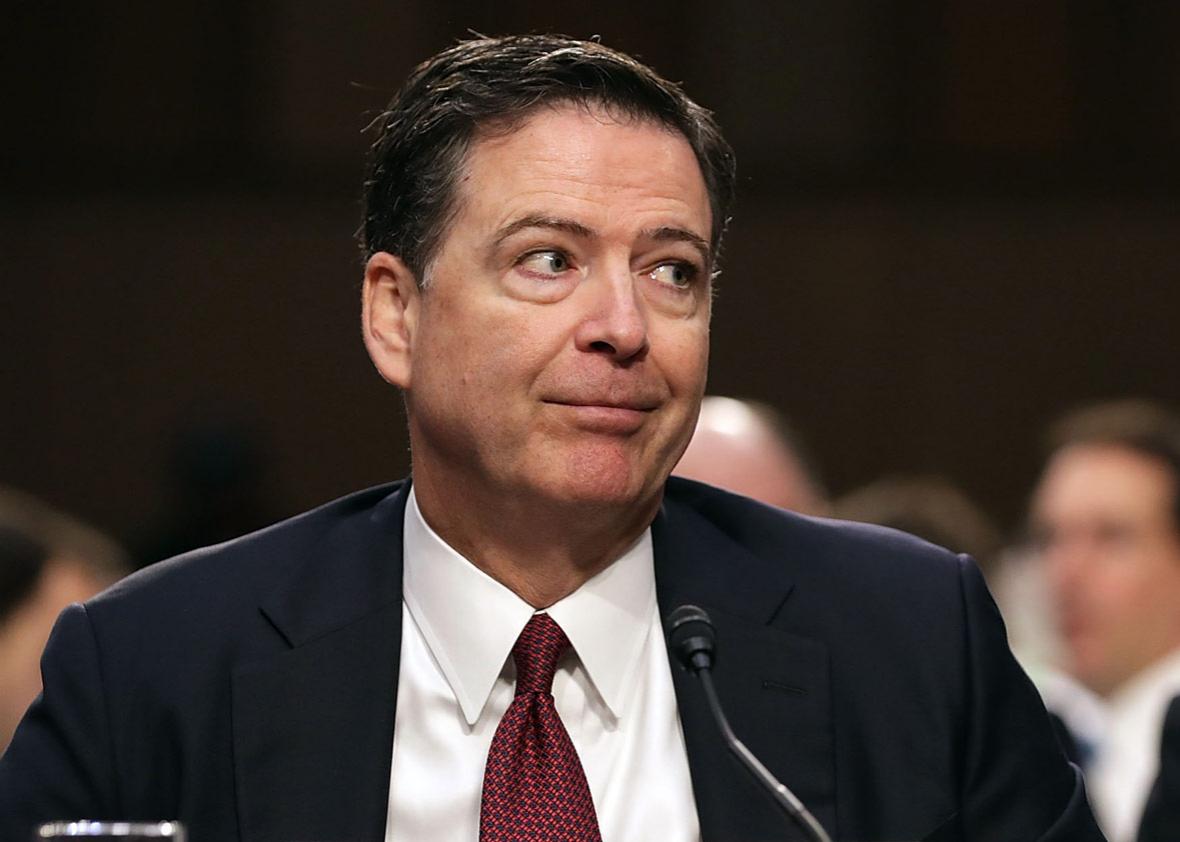Donald Trump typically claims that anyone who makes him look bad is nothing more than a rotten liar. Political opponents, beauty queens, alleged victims of sexual assault: Trump dismisses them all as fibbers and fabricators, spewing malicious falsehoods to besmirch his character and hurt his agenda. It was therefore no surprise that, following James Comey’s extraordinarily damaging testimony on Thursday, Trump accused the former FBI director of issuing “many false statements and lies” to the Senate Intelligence Committee. He then repeated this allegation at a Friday press conference and offered to go under oath to contradict Comey.
But not all lies are created equal—and Trump’s charge is not just a mere deflection, designed to dull the impact of Comey’s testimony before it fades away altogether. Even if he meant it that way, Trump has still accused Comey of perjury, a federal crime that undermines our legal system and carries serious penalties. He likely doesn’t realize the severity of this accusation; he routinely throws perceived enemies under the bus for the sake of political expediency. But this time, his habit will backfire. The president’s reckless barb is certain to escalate the conflict between the two men. And Trump has already given Comey the upper hand.
Among lawyers and government officials, the charge of perjury is not taken lightly, and for good reason: An individual found guilty of the crime may be fined and imprisoned for up to five years. In 1973, the Supreme Court set a high bar for perjury: An ambiguous, evasive, or even misleading statement doesn’t necessarily qualify. That’s a key reason why, since the 1940s, only six people have been convicted of perjury in relation to congressional testimony.
But a lie—an intentional untruth made under oath—indisputably qualifies as perjury. And perjury is precisely what Trump alleged on Friday morning by asserting that Comey’s testimony was filled with “false statements and lies.” This claim built on a statement issued by Marc Kasowitz, the president’s attorney, that directly contradicted Comey’s testimony by declaring that Trump “never told Comey, ‘I need loyalty, I expect loyalty,’ in form or substance.” Comey testified that Trump said exactly that. Kasowitz and, more importantly, Trump himself are calling Comey a perjurer. Meanwhile, Comey, by rejecting Trump’s explanation of his firing, is calling the president a liar.
Which means, of course, that somebody is lying—either the former director of the FBI or the president of the United States. Who you believe might depend on your politics, or your read of each man’s character. Comey spent his career building a reputation for independence and candor; Trump, who did quite the opposite, is now defaming him in order to subvert that image of integrity. Fortunately, this particular dispute need not be litigated exclusively in the court of public opinion. Instead, Comey has a clear advantage: He has told his side of the story under penalty of perjury, and it has been corroborated by others. What has Trump done to substantiate his version of the narrative? Smear Comey as a fabulist through his attorney and his Twitter feed.
That response isn’t just insufficient. It’s pathetic by any rational standard. If the Trump administration truly believed that Comey had committed perjury, the Justice Department would, at a minimum, consider investigating his alleged crime. (It won’t.) If Trump himself really believed Comey had slandered him before Congress, he could set the record straight by rushing to go under oath as well. On Friday, he said he would agree to rebuke Comey under oath if asked. We’ve seen Trump make and break this kind of promise in the past; for now, it suffices to say that until Trump goes under oath, Comey’s narrative will essentially stand as the official public record.
This state of affairs leaves Trump in a bind. He wants the country to view Comey as a vengeful fabulist, but the empty accusations of perjury he launched from the safety of the White House do not seriously contradict the picture Comey painted of a petty and manipulative president. Comey put his reputation on the line to defend his actions and his former agency. He created a paper trail documenting Trump’s attempts to subvert FBI investigations and made sure the world would hear about it—effectively guaranteeing his eventual testimony before Congress. Why would he orchestrate this plan if it were built on lies that could land him in prison?
Trump’s version of the story does not make sense. His charge of perjury is laughable. He is losing his grasp on the narrative, unintentionally ceding it to Comey. Thursday’s testimony may not have been damaging enough to be the definite end for Trump. But the president’s inability to mount a plausible defense to Comey’s astonishing claims is incredibly damning. Trump is in trouble. And, for perhaps the first time in his life, disgorging more lies won’t help him deflect the blame.
*Correction, June 10, 2017: Due to a photo provider error, the photo caption on this article originally misstated that Comey was imitating an expression he said he saw President Trump make. He said it was an expression he saw Jeff Sessions make.
